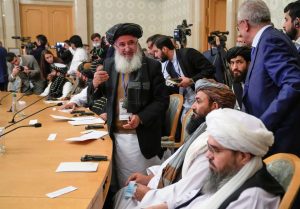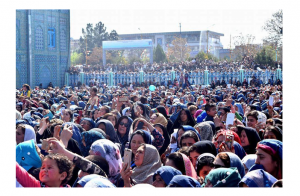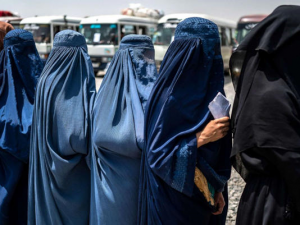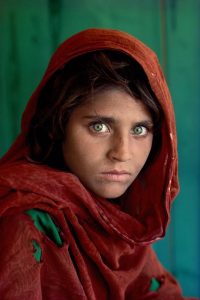Afghan Women: Victims of Entrenched Cultural Attitudes and Expectations:
Historically, despite their sizable share in the overall population of Afghanistan, and their significant contribution to the country’s economic life (particularly in agriculture, handicrafts, industry, primary-secondary formal education, horticulture, animal husbandry, domestic services, and of course, homemaking and child raising), most Afghan women and girls have been treated merely as means of procreation and a caste of cheap labor with few or no rights to make decisions of their own. Almost all key decisions affecting a woman’s life in Afghanistan are made by the male members of the family, including fathers, male siblings, and/or even uncles and male cousins. If you are a woman in Afghanistan, even your male neighbor can interfere in your life, by constraining/surveilling your movements, actions, and relations. Whether to venture out of the house, whether to attend school, whether to get married and whom to get married to, and what kind of dress or veil to wear are all issues that are mostly decided by others, not the women and girls themselves. Suppression of their voice and restrictions on their lives have turned most Afghan women and girls into ghost members of their society. They exist as indispensable tollers and laborers of the extended family, but they must live and toll silently behind the walls of their homes.
Afghan tradition in general expects women and girls to be reserved, shy, non-responsive to, and noncomplaining with the hardships of the family and its surrounding environment. Stigmatizing a woman for being assertive and able to express her views serves as a strong disincentive for a woman to demand her rights and make her own decisions. An independent-minded, assertive woman or girl quickly earns the nickname shaleeta (a bitch). Being considered a shaleeta is a highly derogatory mark, a mark that robs a girl of the chance of finding a proper husband. Tradition and family upbringing teaches Afghan men to expect obedience, detachment, flat affect, and quietness from their wives. From the point of view of an Afghan man or his family, the most desirable traits that make a good wife are an obedience (sar bazeri or etaa-at) and shyness (hayaa). A woman’s assertiveness and independent-mindedness are a sign of disobedience and shamelessness, and, thus, liability for a young woman in finding a husband.
Chained by the weight of tribal tradition, deprived of the right to education, and imprisoned inside their homes, most Afghan women and girls have been deprived of the opportunity to achieve the status they deserve in terms of the contributions they make toward the welfare of their family and the wellbeing of the larger society. Over the long hauls of history, Afghan women’s basic rights such as the right to attend school, reveal their faces in public, work outside of the house, choose their own husbands, and participate in public life and decision-making have been severely constrained.
The slow and difficult pace of societal change and the lasting, entrenched traditions of a tribal life has caused the literacy rate of Afghan women to be one of the lowest in the world. It is estimated that only about 24% of Afghan women living in cities can read and write. This figure for rural areas is, no doubt, much lower, perhaps close to 5 to 10 percent. As a result of the low literacy rate, hygiene and sanitation awareness among Afghan women living in the countryside is limited, a factor that, among other things, may explain the high maternity-death rate as well as the high children’s death rate in the country.
As already mentioned, most decisions made with respect to the fate of women and girls in Afghanistan are made by their male relatives. Whether to venture out of the house, whether to attend school, whether to get married and whom to get married to, and what kind of dress or veil to wear are all issues that are decided by others than the women and girls themselves. Silencing women’s voices and taking away their right to make their own decisions have turned most Afghan women and girls into ghost members of their society. They exist as indispensable laborers and tollers of the extended family, but at the same time, they must live and suffer silently, hidden behind the walls of their homes.
The legal system of Afghanistan, a hodgepodge of civic law, tribal practices, and misguided clerical interpretation of the holy text, provides little meaningful protection for women and girls mistreated by their husbands and the rest of their surrounding environment, an environment that hardly leaves any room for women to act as independent selves and agents of their own interests. In the face of lacking legal remedies, Afghan women are forced to appeal to talisman and voodoo remedies. To attract the kindness and mercy of an abusive husband, the Afghan woman appeals to a village cleric or Mullah who charges exuberant prices for all sorts of Shoests (magic drinks) and taweez (amulets). This practice is particularly common among women who live in polygamic marriages, where a favorite wife attracts the hate and jealousy of an unfavorite wife.
Ancient Afghan Tribal Traditions under which Afghan Women Continue to Suffer:
There are many onerous traditions and practices that make life miserable for women and girls of Afghanistan. These traditions and practices keep Afghan women in servitude and prevent them from acting as independent agents of their own interests. The following is a short list of such traditions and practices:
- A woman who becomes a widow is mostly deprived of the right to remarry according to her own will. Widows with children are mostly wedded to the brother or another close relative of the deceased husband. If the deceased has no close adult relative of the same age, his widow is married to a young boy of the extended family or to a much older relative.
- In some parts of the country, young, sometimes premature girls, are exchanged among families or tribes to settle blood feuds (the so-called swara (سواره) tradition).
- A woman or girl falling in love with a stranger and leaving the family house without the consent of male relatives is shunned and pursued life, becoming pry to honor killing (a practice called namusdari).
- Prenatal sexual affairs or pregnancies mostly lead to honor killing of those involved.
- Virginity is considered the key to an honorable marriage. A girl who is discovered to have lost her virginity before marriage can face horrific punishments, including being killed by the family of the groom or by her own family.
- Sometimes newly born baby girls are engaged with newly born boys to keep land property within the same extended family or to consolidate friendships between two families. This practice ends years later either in an unwanted, abusive marriage or, in case of breaking the engagement, in a long-lasting feud between the families concerned. The breaking of the engagement, in this case, is considered a Benamusi (violating/breaking someone’s honor).
- The inheritance rights of women are violated on a regular basis, where male siblings deprive their female siblings of the right to receive their legitimate share of the parents’ inheritance.
- Poor families, who cannot afford to pay a bride price for a son ready to get married, engage in exchange marriages. In such a case, family A agrees to give its daughter to the marriage of the son of family B, while family B agrees to give its daughter to the marriage of the son of family A. This exchange happens without the consent of either daughter.
- Occasionally, prepuberty Afghan girls are given, or sold, into marriages with much older, even septuagenarian, men who are rich enough to pay a bride price to the girl’s relatives.
- Traditions and the legal system of Afghanistan are strongly averse to lawsuits for divorce by women, thus making dysfunctional and abusive marriages last for life.
- In many Afghan communities, Polygamy is not only condoned and well accepted, but also aspired to and looked up on as a sign of men’s social standing and wealth. In polygamous cases, women in Afghanistan suffer untold physical and psychological abuses in the hands of their husbands and second and third (even fourth) wives.
- A girl reaching puberty is considered ripe for marriage without regard to her wish or need to further her education. Unmarried young girls are looked upon as a social risk and liability for the family and rushed into unwanted wedlock.
- During hard economic times (such as droughts, famine, and migration), young girls, and sometimes young boys also, are sold to feed the other members of the family.
For Part I click here.
(Part 3 of this article will look at efforts by the Afghan state to emancipate women)




